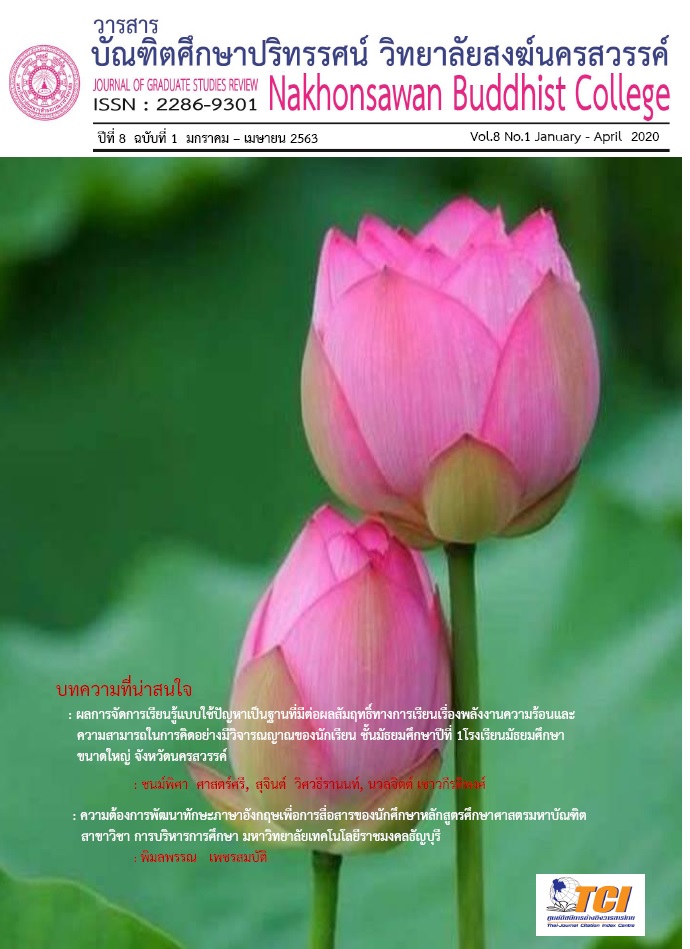ผลการจัดการเรียนรู้แบบใช้ปัญหาเป็นฐานที่มีต่อผลสัมฤทธิ์ทางการเรียน เรื่องพลังงานความร้อนและความสามารถในการคิดอย่างมีวิจารณญาณของนักเรียน ชั้นมัธยมศึกษาปีที่ 1 โรงเรียนมัธยมศึกษาขนาดใหญ่ จังหวัดนครสวรรค์
Main Article Content
บทคัดย่อ
วัตถุประสงค์ของการวิจัย 1) เพื่อเปรียบเทียบผลสัมฤทธิ์ทางการเรียนเรื่อง พลังงานความร้อนของนักเรียนชั้น ม.1ระหว่างกลุ่มที่ได้รับการจัดการเรียนรู้แบบใช้ปัญหาเป็นฐาน(กลุ่มทดลอง) กับกลุ่มที่ได้รับการจัดการเรียนรู้แบบปกติ (กลุ่มควบคุม) 2) เพื่อเปรียบเทียบความสามารถในการคิดอย่างมีวิจารณญาณของนักเรียนชั้น ม.1 ระหว่างกลุ่มทดลองกับกลุ่มควบคุมและ 3)เพื่อเปรียบเทียบความสามารถในการคิดอย่างมีวิจารณญาณของนักเรียนกลุ่มทดลองระหว่างก่อนเรียนและหลังเรียน กลุ่มตัวอย่างคือ นักเรียนชั้น ม.1 ของโรงเรียนลาดยาววิทยาคม จังหวัดนครสวรรค์ จำนวน 80 คนได้มาโดยการสุ่มแบบกลุ่ม สุ่มเป็นกลุ่มทดลอง 40 คนได้รับการจัดการเรียนรู้แบบใช้ปัญหาเป็นฐาน กลุ่มควบคุม 40 คนได้รับการจัดการเรียนรู้แบบปกติ เครื่องมือวิจัยคือ แผนการจัดการเรียนรู้แบบใช้ปัญหาเป็นฐาน แผนการจัดการเรียนรู้แบบปกติ แบบทดสอบวัดผลสัมฤทธิ์ทางการเรียนและแบบวัดความสามารถในการคิดอย่างมีวิจารณญาณ สถิติที่ใช้คือ ค่าเฉลี่ย ส่วนเบี่ยงเบนมาตรฐาน วิเคราะห์ความแปรปรวนร่วม และทดสอบค่าทีแบบกลุ่มสัมพันธ์ ผลการวิจัย พบว่า 1) ผลสัมฤทธิ์ทางการเรียนหลังเรียนของกลุ่มทดลองกับกลุ่มควบคุม มีคะแนนพัฒนาการที่สูงขึ้นทั้งสองกลุ่ม คะแนนเฉลี่ยไม่ต่างกัน 2) ความสามารถในการคิดอย่างมีวิจารณญาณหลังเรียนของกลุ่มทดลองสูงกว่ากลุ่มควบคุม อย่างมีนัยสำคัญทางสถิติที่ระดับ .05 3) ความสามารถการคิดอย่างมีวิจารณญาณหลังเรียนของกลุ่มทดลอง สูงกว่าก่อนเรียนอย่างมีนัยสำคัญทางสถิติที่ระดับ .05


